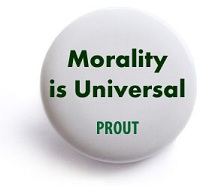 PROUT seems to be promoting a moral standard. How can there be one set of moral principles for all people everywhere?
PROUT seems to be promoting a moral standard. How can there be one set of moral principles for all people everywhere?
Morality cannot be a goal in itself and the same expression of morality cannot apply to everybody at all times. The world is constantly changing and people’s moral awareness therefore also changes. As a result, people somewhere and at some time tend to view moral principles differently from other peoples and other times.
Still, morality is the need of the hour and the base and starting point of humanity. Without a practical morality individual and social life collapses into purposelessness. Even if individuals and societies profess some goal they would be unable to reach it if their backbones are broken by lack of basic morality. Morality is the prerequisite of our individual and social march.
PROUT’s morality promotes progress. Its core principles are based on basic human spirituality and they support the development of both individual and collective interests. In keeping with its fifth fundamental principle, PROUT accepts that the human sense of morality varies from one individual to another, from one society to another, from place to place, and from time to time, and that it should be of a progressive nature.
The morality reflected in PROUT’s requirements of an ideal constitution offers an outline of the moral quality of PROUT:
- Complete security should be guaranteed to all the plants and animals on the planet.
- Each country must guarantee purchasing power to all its citizens
- The constitution should guarantee four fundamental rights – spiritual practice, cultural legacy, education, and indigenous linguistic expression.
- If the practice of any of these rights conflicts with cardinal human values then that practice should be immediately curtailed.
“Public education is one of the fundamental needs for a successful and smooth-running democracy. In some places even people of education misutilize their voting rights. People cast their votes according to the dictates and persuasion of the pseudo-leadership. Is it not a farce in the name of democracy? Hence the spread of education and proper knowledge is essential. Education does not mean literacy alone. To my mind, education means proper and adequate knowledge and power of understanding. In other words, education is perfect knowledge of what I am and what I should do.
Democracy and morality
Since WW2, democracy has been actively propagated as a system with such core values as equal participation, human rights, etc. If we look a little closer we are forced to admit that democratic values are touted wherever capitalism wants to create stability for expanding its global markets. In this sort of democracy, commercial rights eventually take precedence over human rights irrespective of the high-sounding words the political system comes wrapped in. It is therefore very difficult to separate any so-called moral value of the present democratic set-ups from capitalist exploitation. It seems that democracy today is first and foremost an efficient tool and alibi for capitalist exploitation and not a moral system.
“Morality is the second fundamental factor for the success of democracy. In the absence of morality, people sell their votes. There are a few countries in the world where votes are being sold and purchased. Can we call this democracy? Is it not a farce? Hence, until fifty-one per cent of the population adheres strictly to the principles of morality, there is no chance of a successful democracy. Where immoral persons are in the majority, the leaders will necessarily be from and among them.” – P.R. Sarkar, The Opinion
